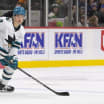How significant is losing the first two games of the season to the Sharks big picture? Let's turn to history and see what it's meant in the past.
San Jose lost its first two games four times before last week's 5-3 and 4-1 setbacks to Philadelphia and Los Angeles, respectively. And twice, including the last time it happened in 2005-06 - the year San Jose acquired Joe Thornton - the Sharks went to the second round of the Stanley Cup playoffs.
The expansion Sharks of 1991-92 lost their first two before winning their first as a franchise, then proceeded to lose 13 straight. And in 2002-03 - well clear of those early growing-pain campaigns - San Jose started 0-2 and never could recover during a season that represents the only time in a stretch of 16 seasons between 1998-2014 that they didn't reach the playoffs.
The 1993-94 Sharks didn't stop at consecutive losses to start. They dropped each of their first eight. No matter, the Cinderella third-year team went 33-27-16 the rest of the way, upset Detroit in the first round and took Toronto to seven games in the West semis before losing.
What we deduce is since two games represents less than three percent of an 82-game regular-season schedule, the team's fate obviously lies ahead regardless of how frustrating an 0-2 start might appear.
Inside the Cage: No Time To Panic

That's also why the Sharks won't panic. Instead, they using the idle time between Saturday's loss to the Kings and Thursday's visit by Buffalo to get themselves righted with some quality practice time.
"I don't know that panic is the word. There should be some urgency," Sharks forward Logan Couture said. "When we come to the rink and practice, whether it's myself or a player who has been here a little while, we need to be better.
"Whether you're a first- or second-year guy you're probably looking over your shoulder now realizing there's guys down on the Barracuda who want to take your job so it's time to really get to work. Everyone has to be better, top to bottom. The blame doesn't lie on a few guys, it's on everyone."
Without key injuries or distractions, the slow start can be attributed to little more than breakdowns, mental mistakes at inopportune moments, some lack of communication in the defensive end and an overall need to give more of each.
"I respect everyone's coming to the rink ready to play, but we're missing something," Sharks captain Joe Pavelski said. "I don't know if it's watching a few of these games, seeing teams score seven or eight goals and expecting we're going to have that, too, and not being prepared to win a 1-0 game. When the goals do come they do.
"Mentally we know we have another level. We're going to have to go back to the start, re-set a few things and come back a little hungrier."
Consensus in the locker room is the problem is not physical. If anything a number of Sharks are maybe guilty of trying to do too much. Norris Trophy winner Brent Burns committed three turnovers in the first period on Saturday, the last of which led directly to a go-ahead goal in the final 10 seconds of the period.
Goalie Martin Jones regretted a couple decisions he made playing the puck against the Flyers, and failing to take charge to cover a rebound against the Kings that instead turned into a goal-against.
The team's usually potent power play, focused on improving on last year's bottom-third standing, failed to convert against the Kings in four tries. And because San Jose spent a lot of time chasing Los Angeles in its own end, coach Peter DeBoer mixed up the defense pairings late just to experiment with a different look. And he changed personnel on three of the four forward lines during Monday's practice, but said nothing was set in stone for Thursday.
"When we're playing well and playing to our strengths - our D zone and our coverage - everything is top notch in the league," defenseman Brenden Dillon said. "Those are a couple instances (Saturday) that we weren't at our best. We know what we've got to do to fix it. We know our guys need to communicate to be successful. The plan is in place, we just have to go out and execute it.
"I think top to bottom we all know we can do better. As a team, the offense is going to take care of itself. But I think, first and foremost, we've got to clean up defensively whether it's turnovers through the neutral zone, giving up odd-man rushes against. That's just not like us."
The early-season break in the schedule gives the Sharks three full days of practice to tinker on the ice, pour over video, commit to the system that's hardly different from the last two years and adopt a more determined attitude.
"We've been given something we know inside out and the commitment to do it just has to be there," Pavelski said. "The commitment level has to go up, and doing it the right way."
"We have enough character in here," Dillon added. "We've got a couple days to work on those things and really have a bunch of good practices and get back to Sharks hockey on Thursday."


















